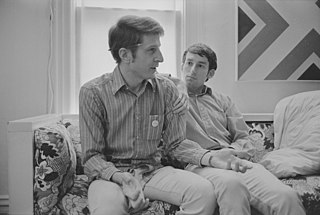Related Research Articles
A domestic partnership is an intimate relationship between people, usually couples, who live together and share a common domestic life but who are not married. People in domestic partnerships receive legal benefits that guarantee right of survivorship, hospital visitation, and other rights.

The availability of legally recognized same-sex marriage in the United States expanded from one state (Massachusetts) in 2004 to all fifty states in 2015 through various court rulings, state legislation, and direct popular votes. States each have separate marriage laws, which must adhere to rulings by the Supreme Court of the United States that recognize marriage as a fundamental right guaranteed by both the Due Process Clause and the Equal Protection Clause of the Fourteenth Amendment to the United States Constitution, as first established in the 1967 landmark civil rights case of Loving v. Virginia.

The Suquamish are a Lushootseed-speaking Native American people, located in present-day Washington in the United States. They are a southern Coast Salish people.

The Duwamish are a Lushootseed-speaking Southern Coast Salish people in western Washington, and the Indigenous people of metropolitan Seattle.

Andersen v. King County, 138 P.3d 963, formerly Andersen v. Sims, is a Washington Supreme Court case in which eight lesbian and gay couples sued King County and the state of Washington for denying them marriage licenses under the state's 1998 Defense of Marriage Act (DOMA), which defined marriage as between a man and a woman. The court ruled that banning same-sex marriage is constitutional since the legislature could reasonably believe it furthers the government's interest in promoting procreation.
Same-sex marriage has been legally recognized in Oregon since May 19, 2014, when Judge Michael J. McShane of the U.S. District Court for the District Court of Oregon ruled in Geiger v. Kitzhaber that Oregon's 2004 state constitutional amendment banning same-sex marriages discriminated on the basis of sexual orientation in violation of the Equal Protection Clause of the U.S. Constitution. A campaign that was then under way to win voter approval of a constitutional amendment legalizing same-sex marriage was suspended following the decision. In July 2015, Governor Kate Brown signed legislation codifying same-sex marriage in various Oregon statutes. The law change went into effect on January 1, 2016.
Same-sex marriage has been legally recognized in the U.S. state of Washington since December 6, 2012. On February 13, 2012, Governor Christine Gregoire signed legislation that established full marriage rights for same-sex couples in the state of Washington. Opponents mounted a challenge that required voters to approve the statute at a referendum, which they did on November 6. The law took effect on December 6, and the first marriages were performed on December 9. Within a couple of days, more than 600 marriage licenses were issued to same-sex couples in King County alone. Washington was the seventh U.S. state, and the eighth U.S. jurisdiction, to legalize same-sex marriages.

This article addresses the history of lesbianism in the United States. Unless otherwise noted, the members of same-sex female couples discussed here are not known to be lesbian, but they are mentioned as part of discussing the practice of lesbianism—that is, same-sex female sexual and romantic behavior.
State Registered Domestic Partnerships (SRDP) in Washington were created in 2007 following the Andersen v. King County decision. Subsequent legislation has made an SRDP the equivalent of marriage under state law. As a result of the legalization of same-sex marriage in the state, from June 30, 2014, SRDP will be available only when at least one of the partners is sixty-two years of age or older.
Many countries in the Americas grant legal recognition to same-sex unions, with almost 85 percent of people in both North America and South America living in jurisdictions providing marriage rights to same-sex couples.
Same-sex marriage has been recognized in Montana since a federal district court ruled the state's ban on same-sex marriage unconstitutional on November 19, 2014. Montana had previously denied marriage rights to same-sex couples by statute since 1997 and in its State Constitution since 2004. The state appealed the ruling to the Ninth Circuit Court of Appeals, but before that court could hear the case, the U.S. Supreme Court struck down all same-sex marriage bans in the country in Obergefell v. Hodges, mooting any remaining appeals.
The Supreme Court decision in Obergefell v. Hodges that legalized same-sex marriage in the states and most territories did not legalize same-sex marriage on Indian reservations. In the United States, Congress has legal authority over tribal reservations. Thus, unless Congress passes a law regarding same-sex marriage that is applicable to tribal governments, federally recognized American Indian tribes have the legal right to form their own marriage laws. As such, the individual laws of the various United States federally recognized Native American tribes may set limits on same-sex marriage under their jurisdictions. At least ten reservations specifically prohibit same-sex marriage and do not recognize same-sex marriages performed in other jurisdictions; these reservations remain the only parts of the United States to enforce explicit bans on same-sex couples marrying.
Charlene D. Strong is an American civil rights advocate and a former member of the Washington State Human Rights Commission.
This is a list of events in 2011 that affected LGBT rights.

The state of Washington is seen as one of the most progressive states in the U.S. in regard to lesbian, gay, bisexual, transgender and queer (LGBTQ) rights; with jurisprudence having evolved significantly since the late 20th century. Same-sex sexual activity was legalized in 1976. LGBTQ people are fully protected from discrimination in the areas of employment, housing and public accommodations; the state enacting comprehensive anti-discrimination legislation regarding sexual orientation and gender identity in 2006. Same-sex marriage has been legal since 2012, and same-sex couples are allowed to adopt. Conversion therapy on minors has also been illegal since 2018.

Referendum 74 was a Washington state referendum to approve or reject the February 2012 bill that would legalize same-sex marriage in the state. On June 12, 2012, state officials announced that enough signatures in favor of the referendum had been submitted and scheduled the referendum to appear on the ballot in the November 6 general election. The law was upheld by voters in the November 6, 2012 election by a final margin of 7.4% and the result was certified on December 5.
This article contains a timeline of significant events regarding same-sex marriage in the United States. On June 26, 2015, the landmark US Supreme Court decision in Obergefell v. Hodges effectively ended restrictions on same-sex marriage in the United States.

This article addresses the history of gay men in the United States. Unless otherwise noted, the members of same-sex male couples discussed here are not known to be gay, but they are mentioned as part of discussing the practice of male homosexuality—that is, same-sex male sexual and romantic behavior.
Seattle Women's Chorus(SWC) is a community chorus based in Seattle, Washington. Founded in 2002, the group is the largest LGBTQ-identified women's chorus in the world. SWC is a member of the Gay and Lesbian Association of Choruses (GALA Choruses) and Chorus America. Both Seattle Women's Chorus and Seattle Men's Chorus are governed by the same non-profit organization, Flying House Productions. Combined, they are the largest community chorus in North America.

This is a timeline of notable events in the history of the lesbian, gay, bisexual, and transgender community in the United States.
References
- 1 2 3 Yardley, William (2011-08-11). "Suquamish Tribe Approves Same-Sex Marriage". The New York Times. ISSN 0362-4331 . Retrieved 2017-10-04.
- ↑ "Washington indian tribe allows gay marriage" . Retrieved 2017-10-04.
- 1 2 Bilger, Audrey; Kort, Michele (2012-03-06). Here Come the Brides!: Reflections on Lesbian Love and Marriage. Da Capo Press. ISBN 9781580054508.
- ↑ "Kitsap County's Suquamish Tribe makes same-sex marriage legal". The Seattle Times. 2011-08-02. Retrieved 2017-10-04.
- 1 2 "Diver Heather Purser Pioneers Same-Sex Marriage for Suquamish - Indian Country Media Network". indiancountrymedianetwork.com. Archived from the original on 2017-09-12. Retrieved 2019-11-11.
- 1 2 3 Duff, Deanna (2012-02-06). "SUQUAMISH TRIBAL MEMBER A LEADER IN WASHINGTON STATE'S MARRIAGE EQUALITY MOVEMENT". Equally Wed. Retrieved 2017-10-04.
- ↑ "Human rights award for Suquamish tribal member". The Seattle Times. 2011-12-09. Retrieved 2017-10-04.
- ↑ "SGN - Seattle Gay News - Page 5 - GSBA Business and Humanitarian Awards honor leadership, philanthropy - Friday, February 24, 2012 - Volume 40 Issue 08". www.sgn.org. Archived from the original on 2017-10-05. Retrieved 2017-10-04.